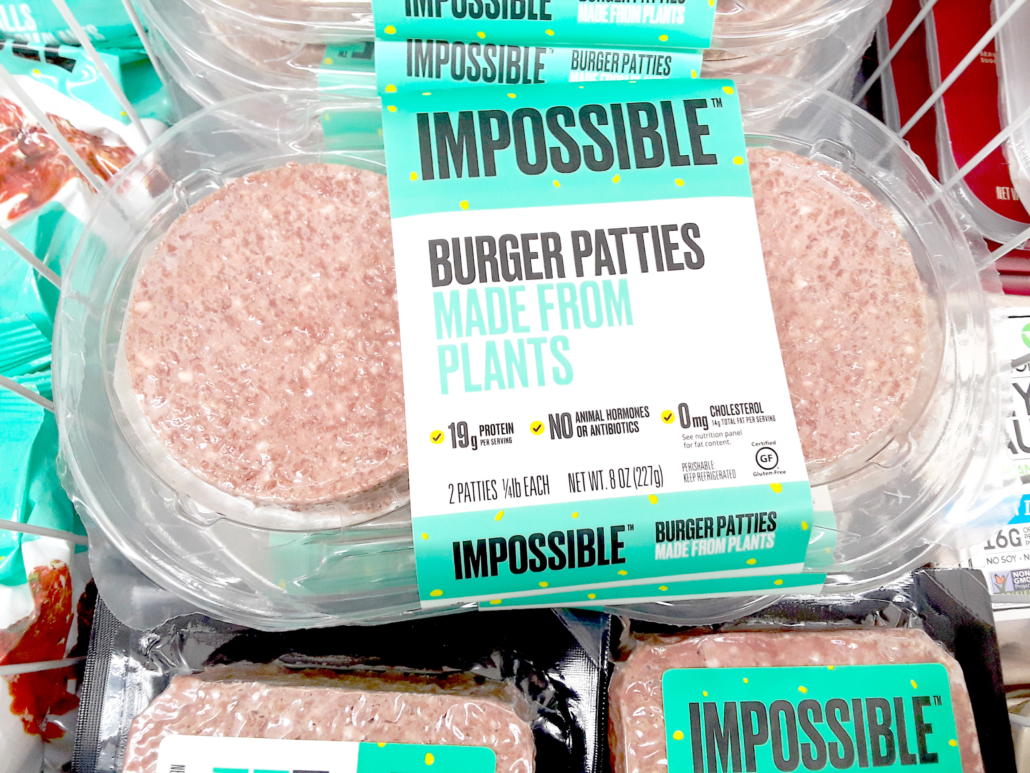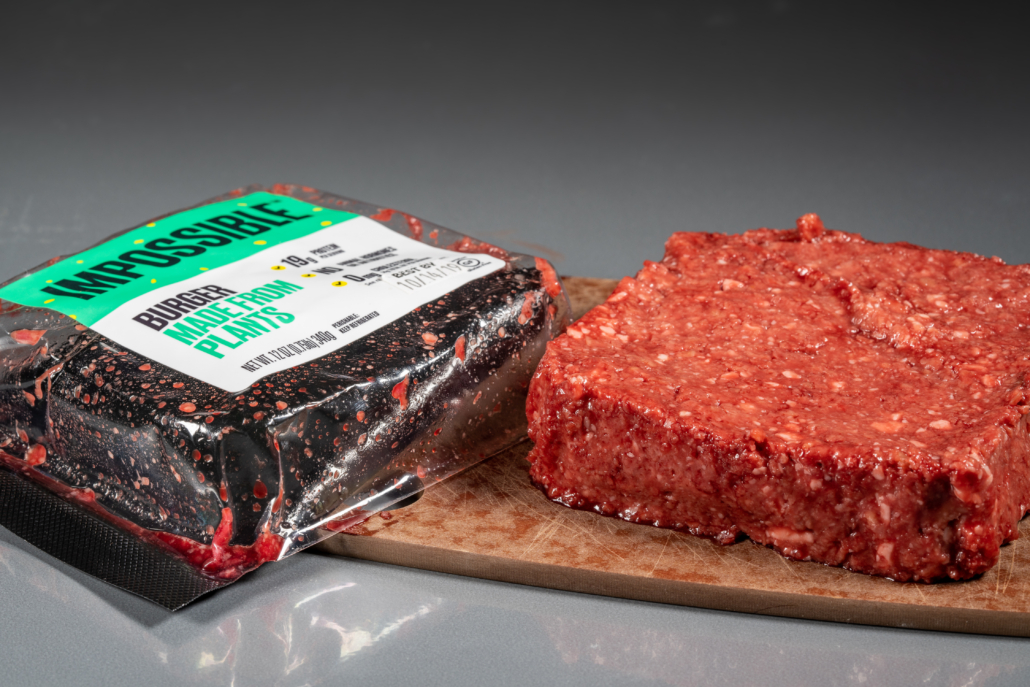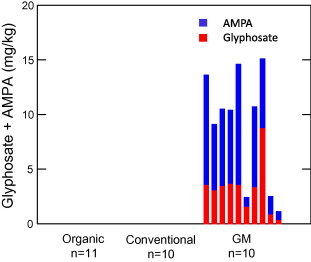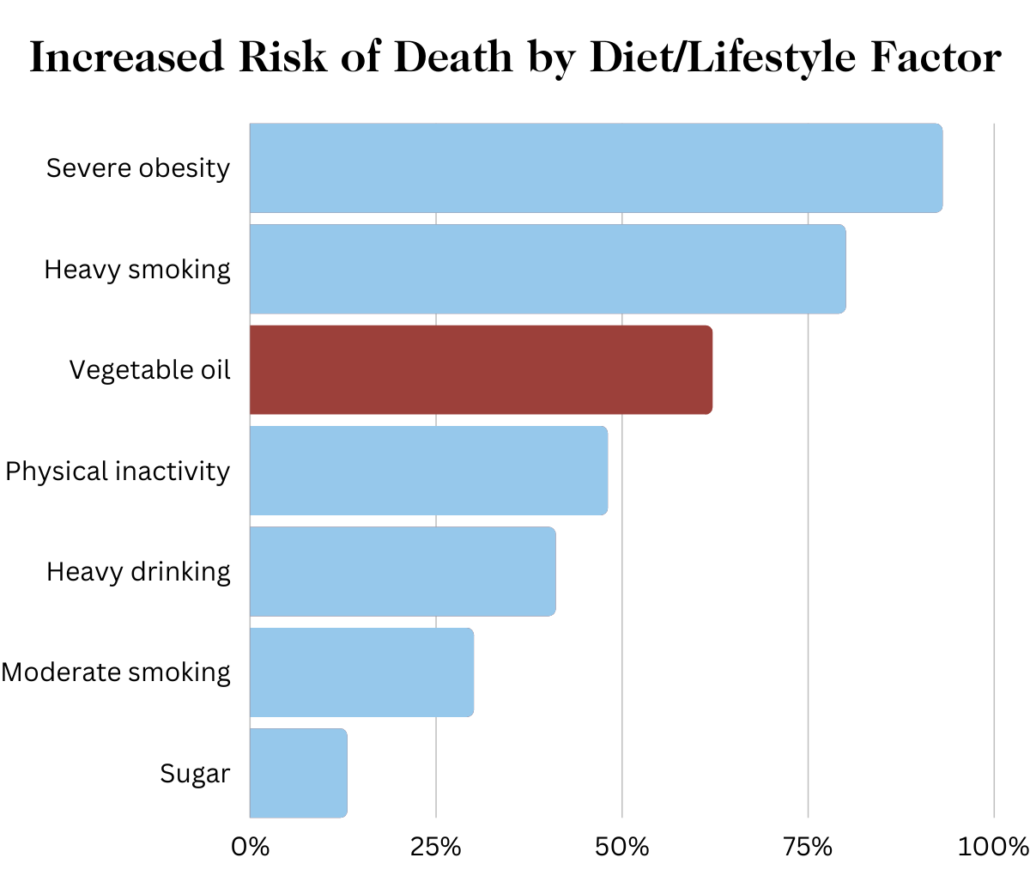We include products in articles we think are useful for our readers. If you buy products or services through links on our website, we may earn a small commission.
Is Impossible Meat Bad for You?

The Impossible Foods company claims that it makes “beef,” “chicken,” and “pork” out of plants, and that these products are “good for you and good for the planet.” But when you turn the package over and look at the label, the highly processed ingredients beg the question; Is Impossible eat be bad for you?
In this article, we’ll explore the healthiness, or lack thereof, of fake meat created by the Impossible Foods and Beyond Meat companies. Our method is simple: We’ll look at what the latest nutritional science tells us about the key ingredients in each of these products.
Table of Contents
What is Impossible Meat?

Impossible Foods and Beyond Meat are two companies that have made their name on creating plant-based alternative meats with a meat-like texture that even “bleeds” when cooked.
The key ingredient of the flagship Impossible Burger and their other meat alternatives is a genetically modified yeast called leghemoglobin. This is the substance that gives these foods a quasi (some might say queasy) meat-like texture and flavor, and makes them “bleed.”
They market their products as environmentally friendlier, healthier, and more ethically aligned than real meat. However, the truth, as they say, is in the pudding, err, burger.
Are the Impossible Burger Ingredients Bad for You?
Like any food, the specific ingredients are what determine whether or not it’s bad for you, so let’s pop the hood on the Impossible Burger and see what’s inside.6
- Water
- Soy Protein Concentrate
- Sunflower Oil
- Coconut Oil
- Natural Flavors
- Methylcellulose
- Cultured Dextrose
- Food Starch Modified
- Yeast Extract
- Soy Leghemoglobin
- Salt
- Mixed Tocopherols (Antioxidant)
- L-tryptophan
- Soy Protein Isolate
Vitamins and Minerals
- Zinc Gluconate
- Niacin
- Thiamine Hydrochloride (Vitamin B1)
- Pyridoxine Hydrochloride (Vitamin B6)
- Riboflavin (Vitamin B2)
- Vitamin B12
If you’re wondering how stuff like methylcellulose and Soy Leghhemoglobin affect your health, read on.
Soy Leghemoglobin
The Impossible Burger derives its meat-like texture, taste, and juices from a compound called leghemoglobin. This synthetic heme is a waste product of genetically modified yeast combined and fermented with DNA from the roots of soy plants.
The redness and flavor of real red meat are produced by a naturally occurring iron-binding protein called myoglobin.
Leghemoglobin is a newly created substance, the long-term safety of which is unknown, according to the FDA.
Studies on the health and safety of leghemoglobin have only been conducted on animals over short time spans. For example, a 2018 study found that rats consuming large amounts of soy leghemoglobin found no negative effects after 28 days.11 These preliminary studies have garnered GRAS status by the FDA, which is an acronym for “generally recognized as safe” for consumption.
Ironically, the animal testing that it took to clear the Impossible Burger as “safe”–at least in the short term–makes it a non-vegan food!
Even though Impossible Burger is 100% plant-based, it’s not certified vegan because animals were tortured to determine that the ultra-processed and genetically modified ingredients are “safe” for humans. Go figure.
Textured Soy Protein
Textured soy protein is another ultra-processed plant-based substance.
TSP is made from dried and ground soybeans that are treated with solvents like hexane that separate the fat/oils from the protein before it is extruded. Extrusion causes a structural change in the soy proteins, making it a highly processed food. It is not considered a natural or whole food.
Potential drawbacks of textured soy protein include
- Digestive issues — Humans lack the enzyme to digest certain carbohydrates and soy. Soy also contains various antinutrients that can make it hard to digest if not fermented, soaked or sprouted.
- Allergies. Soy is one of the most allergenic foods that people commonly eat. Symptoms include rashes, indigestion, bloating, and more serious issues like anaphylaxis, which can be life-threatening.
- Hormone disruption— Soy contains isoflavones, a type of plant estrogen called a phytohormone. These compounds can interfere with human reproduction and physical development if consumed in large quantities.
- Genetically Modified Organisms (GMO): The soy protein in Impossible Burger is explicitly GMO. These beans are engineered to resist a toxic pesticide called Roundup, AKA glyphosate. No surprise that they retain dangerous concentrations of glyphosate residue.

- Harmful Pesticides: Glyphosate used on soy is considered “probably carcinogenic” by the World Health Organization. When glyphosate enters the intestines, it stimulates a highly inflammatory protein called zonulin.[25]Zonulin is a key biomarker (tell-tale sign) of impaired gut barrier function, and various autoimmune, neurodegenerative, and tumoral diseases.
Methylcellulose
Methylcellulose is an industrial product created from cellulose–an indigestible plant carbohydrate.
It’s better known as the bulk-forming laxative Citrucel. But in Impossible meat, it’s used as a binding agent.
That’s right, the GMO soy protein and DNA-yeast fermented pseudo-meat juice is all bound together by an indigestible compound that is sold in pharmacies as a laxative. What could go wrong?
Constructing methylcellulose requires heating cellulose with a chemical solution and treating it with a type of gas called methyl chloride. According to the EPA methyl chloride is mainly used for
- the production of silicones, where it is used to make methylate silicon.
- in the production of agricultural chemicals, methylcellulose, quaternary amines, and butyl rubber and for miscellaneous uses, including tetramethyl lead.
- in refrigerators in the past, but this use has been taken over by newer chemicals such as Freon.
Though human studies on methyl chloride don’t exist, studies on rats have found that male rats suffer kidney tumors while male rats suffer testicular lesions and decreased sperm production.
This industrial process involving carcinogenic gas results in a gel texture that melts as it cools, making it an effective binding ingredient for processed food products.
Known side effects of methylcellulose include
- Excessive bowel activity
- Gas (flatulence)
- Fecal impaction
Coconut and Sunflower Oil
Recently Impossible Foods reduced the amount of coconut oil and added Sunflower oil to reduce the overall saturated fat.
First of all, saturated fat has been unfairly maligned since the 1960s and has recently been reconsidered as an important fat that is not associated with heart disease, cancer, or risk of stroke when consumed as part of whole foods including, drum roll please… fresh red meat!
Coconut oil on its own is actually a relatively beneficial ingredient. Research on traditional cultures like the Tokelau islanders and Kitavan people of Papua New Guinea discovered that they were in great physical health and had extremely low incidences of heart disease.
So what happens when you cater to anti-SFA dogmatists by boosting industrial “vegetable” oils high in Polyunsaturated Fatty Acids?
Well, according to nutritional science, you make the food deadly.
PUFAS are highly inflammatory. This explains studies that have found that by replacing saturated fat with polyunsaturated fats, researchers lowered cholesterol by 14%. Yet, this reduction resulted in a “22% higher risk of death for each 30 mg/dL reduction in serum cholesterol.”
Another study called the Sydney Heart Health Study was conducted to support the Australian Heart Association’s hypothesis that replacing SFAs with PUFAs from seed oils would improve CVD risk factors.
Well, that backfired! Here’s another instance where the group that replaced saturated fat with vegetable oils lowered cholesterol but had a 62% higher death rate!
In 2019, these and many other major studies prompted 19 British Medicine Journal editorial reviewers to call for a retraction on WHO guidelines for reducing saturated fat.
To put the risk of consuming vegetable oils into perspective, their the third leading lifestyle risk factor for increased mortality behind only morbid obesity and heavy smoking.

“↑” = “Increased consumption of”; Severe obesity: BMI 35–40 [a]; Heavy smoking: ≥10 cigarettes/day (avg 21.97 or ~1 pack) [b, c]; Vegetable oil: Increase consumption by 12% of calories [d]; Physical inactivity: <2 times/week [e]; Heavy drinking: >14 drinks/week for men or >7 drinks/week for women [f, g, h]; Moderate smoking: <10 cigarettes/day [i] Sugar: ≥73.2g sugar/day for women or ≥79.7g sugar/day for men [j]; ; Air pollution: per 10 μg/m3 long-term exposure to PM 2.5 [n, o]
Vitamins and Minerals
So what about the Zinc Gluconate, Niacin, Thiamine Hydrochloride (Vitamin B1), Pyridoxine Hydrochloride (Vitamin B6), Riboflavin (Vitamin B2), Vitamin B12?
Well, let’s call it what it is, a bunch of industrial multivitamin additives mixed in with a bunch of other GMO industrial ultra-processed compounds.
We know that multivitamins are remarkably ineffective. Studies have found that they don’t reduce the risk of heart disease, cancer, cognitive decline, or early death.
This tells us that synthetic and isolated vitamins aren’t absorbed and used in the body in the effective ways that we see with whole foods like, well, real meat.
Environment?
To be fair, Impossible Burger doesn’t market itself as a healthier alternative to meat. Just a more environmentally sustainable and ethical choice.
But the reality is that if you’re concerned about the environment, would you actually want to support industrial mono-crop farming with GMO plants that require heavy pesticide use?
If you’re vegan or vegetarian, just make your own vegetable patties out of organic whole foods.
And if you’re not vegan or vegetarian, a much more environmentally friendly choice is to choose meat that is farmed with regenerative practices.
Regeneratively farmed meat sequesters carbon and produces natural as opposed to chemical fertilizers while producing healthy nutrient-dense whole foods.
Make no mistake about it, industrial agriculture practices are the real environmental issue; grass-fed, regenerative beef is better for the environment and your health.
Impossible Burger Nutrition Facts vs Beef Burgers
| The Impossible Burger | 80% lean ground beef | 90% lean ground beef | |
| Calories | 230 | 287 | 199 |
| Total fat | 13 grams | 22.6 grams | 11.3 grams |
| Carbs | 9 grams | 0 grams | 0 grams |
| Protein | 19 grams | 19.4 grams | 22.6 grams |
| Fiber | 5 grams | 0 grams | 0 grams |
| Added sugar | less than 1 gram | 0 grams | 0 grams |
| Sodium | 16% of the Daily Value (DV) | 3% of the DV | 3% of the DV |
| Vitamin B12 | 130% of the DV | 101% of the DV | 104% of the DV |
| Folate | 20% of the DV | 2% of the DV | 2% of the DV |
| Thiamine | 30% of the DV | 4% of the DV | 4% of the DV |
| Riboflavin | 15% of the DV | 13% of the DV | 13% of the DV |
| Niacin | 50% of the DV | 30% of the DV | 36% of the DV |
| Zinc | 50% of the DV | 43% of the DV | 49% of the DV |
| Iron | 25% of the DV | 12% of the DV | 14% of the DV |
| Selenium | not listed | 31% of the DV | 34% of the DV |
Is Impossible Meat Bad for You? The Bottom Line
When examining the ultra-processed ingredients that constitute Impossible meat, including textured soy protein, vegetable oil, GMO yeast waste products, and industrial binding agents, it’s fair to conclude that Impossible meat is bad for you.
The GMO soy can cause allergic reactions, and it’s treated with carcinogenic and inflammatory pesticides like Roundup. Vegetable oil is perhaps the most deadly “food” product in the history of humanity. The binding agent is sold as a pharmaceutical laxative.
If you’re looking for a healthy food, look elsewhere.





















